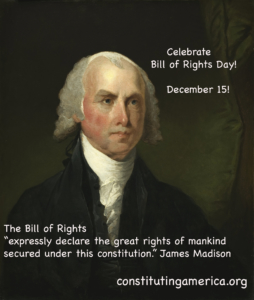James Madison, the Bill of Rights & Political Compromise

James Madison, the “father of the Bill of Rights”
As we celebrate the anniversary of the adoption of the Bill of Rights, American politics and civic life seems more and more divided. The founding generation often saw a political environment that was just as divided as ours, if not even more so. Virginia statesman James Madison gives us an example of principled compromise to achieve the principles of limited government and inalienable rights as he became the “father of the Bill of Rights.”
The origins of Madison’s work creating the Bill of Rights was rooted in his experience in the 1780s. In Virginia, he witnessed the established Anglican Church violating the freedom of conscience of religious dissenters. As a result, he became the primary advocate for Thomas Jefferson’s Virginia Statute for Religious Freedom. In early 1787, Madison was preparing for the Constitutional Convention and wrote an essay entitled “Vices of the Political System” detailing the flaws of the Articles of Confederation. One of the main problems in his view was that tyrannical majorities in the states passed unjust laws violating the rights of minorities.
At the Constitutional Convention, Madison supported the constitutional principles that would limit government and protect individual liberties. However, he lost one central feature of his plan of government—a national veto over state laws to prevent majority tyranny in the states. Still, he became one of the greatest supporters of the Constitution.
During the ratification debate, the Federalists who supported the Constitution had to promise that they would pass a bill of rights if the Antifederalist opponents agreed to a bill of rights. Madison opposed a bill of rights because he thought that they were often just “parchment barriers” that overbearing majorities violated in the states. At this point, he thought “the amendments are a blemish.”
Madison conducted an extensive correspondence with his friend Thomas Jefferson, who was in Paris at the time. Jefferson lamented the absence of a bill of rights in the Constitution and asserted, “A bill of rights is what the people are entitled to against every government on earth.” Madison began to change his mind.
Madison ran against Virginian James Monroe for a seat in the House of Representatives and made a campaign promise to support a bill of rights, particularly liberty of conscience. He also composed President George Washington’s Inaugural Address, which indicated support for a bill of rights in the First Congress.
Representative Madison became the champion for a bill of rights in the First Congress, but met a hostile reception for the idea. Most representatives and senators thought that the Congress had more important work to do setting up the new government. Madison was undeterred and dedicated to the cause of protecting the people’s liberties.
On June 8, 1789, Madison rose on the floor of the House to deliver a speech in favor of a bill of rights. His arguments were founded on a harmonious political order and the ideals of justice. A bill of rights would convince the Antifederalists of the “principles of amity and moderation” from the Federalists, especially when they fulfilled a sacred promise made during the ratification debate. Rhode Island and North Carolina, which had withheld their ratification of the Constitution, would also join the Union. Mostly, the Bill of Rights would “expressly declare the great rights of mankind secured under this constitution.”
Madison then skillfully guided the amendments through the Congress. He reconciled all the various proposals for amendments from the state ratifying conventions and kept the amendments protecting essential liberties. He wanted them to be woven into the text of the Constitution, and sought a key amendment to protect religious freedom, a free press, and a trial by jury against violation by state governments. He lost both these provisions but still guided the Bill of Rights through Congress. Congress approved twelve amendments, and President Washington sent them to the states.
On December 15, 1791, Virginia became the last state to ratify the first ten amendments known as the Bill of Rights. The Bill of Rights fulfilled Madison’s goals of reconciling the opponents of the Constitution and protecting individual liberties. He did not get everything he wanted but compromised often along the way to secure limited government and the essential rights of the people.
Tony Williams is a Constituting America Fellow and the author of Washington & Hamilton: The Alliance that Forged America and the forthcoming Hamilton: An American Biography.


Trackbacks & Pingbacks
[…] To excerpt the ending of Tony’s splendid article over at Constituting America: […]
Comments are closed.